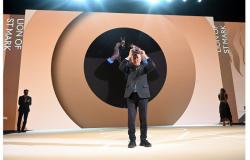Vienna Opera plays June 8-18 Nabucco by Verdi. Opera as much as oratorio, this lyrical drama announces in its Shakespear-like human relationships and its bright colors the great Verdian dramas to come as Don Carlo, MacbethOr Othello.
The Austrian director Gunter Kramer chooses sobriety to illustrate this drama with a stage furnished solely with a glass cube containing crown and scepter, a chair and a small children’s theater, as well as by depicting the opposition between Hebrews in black and white with the Babylonians in royal blue and blood red thanks to their associated colors. The clothes of the German costume designer Falk Bauer and the choir holding the portraits of the people kidnapped by Hamas during the going to think add contemporaneity to the action. Certain elements, such as a long text in Hebrew covering the view of the Hebrews or popular Jewish dances, slightly spoil the overall impression of the production.
Musically, the work is divided into a first part during which the orchestra led by the Italian conductor Giampaolo Bisanti plays so loudly that the choirs struggle to be heard, the performers push their voices and erase the nuances of the score and a second after the break during which he lets them breathe just enough.
Which is a shame given the quality of the performers.
Starting with Italian soprano Anna Pirozzi as Abigaille, who puts her vocal strength at the service of emotion, although she occasionally stands up to the fortsisimo of the orchestra. She dares to risk being covered by the strings and brass to remain in the emotion given by her role. A woman in love, wounded, but strong and proud, with a Lady Macbeth character, she leaves an impression of power and fire.
Then the Mongolian baritone Enkhbatyn Amartüvshin, who, once relieved from the crushing of the orchestra, lets his virile, velvety and serious voice bring the king to life in redemption. If stasis dominates his game in the first part, his economy of gestures, giving all their values to his leaning posture, his untied tie and his simple movements, advances towards a natural game, without arrogance and finesse in the second part.
The Hungarian mezzo Szilvia Vörös, as Fenena, who, with a suave, nuanced and soft singing, opposite to that of Anna Pirozzi, creates a tension between the female characters that is quite captivating. And the Italian tenor Ivan Magri as Ismael and the Argentinian tenor Agustín Gómez as Abdallo, with articulation and phrasing as clear as fresh, are particularly appreciable in their roles as young men.
Unfortunately the Croatian baritone Marko Mimica as Zaccaria does not convince as much, not controlling his vibrato well and singing sometimes without emotion.
As is often the case at the Vienna Opera, the evening is well worth the trip.
Vienna, Wiener Staatsoper, June 16, 2024
Andreas Rey
Photo credits: Wiener Staatsoper Michael Poehn.





